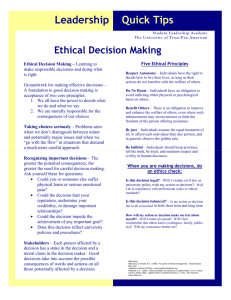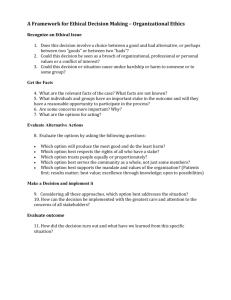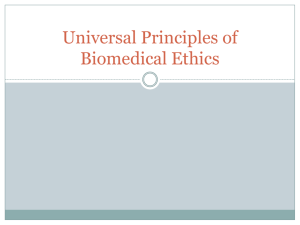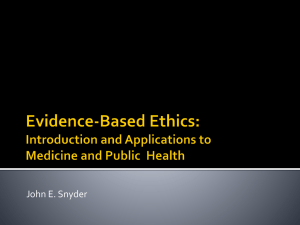Medical Ethics
advertisement
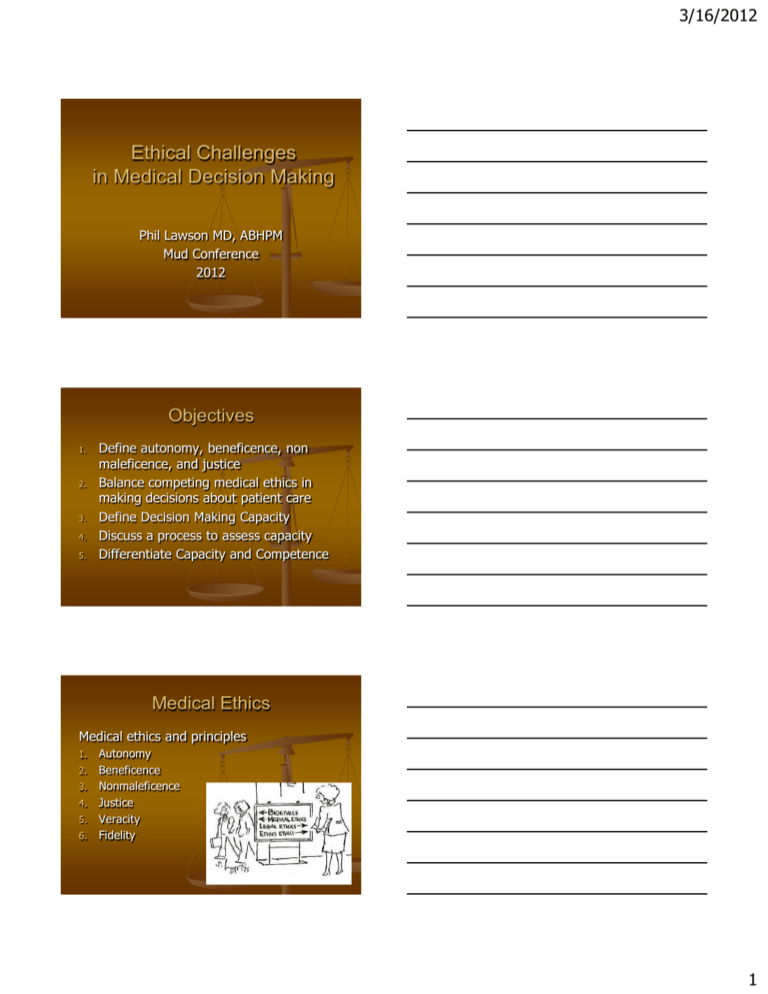
3/16/2012 Ethical Challenges in Medical Decision Making Phil Lawson MD, ABHPM Mud Conference 2012 Objectives 1. 2. 3. 4. 5. Define autonomy, beneficence, non maleficence, and justice Balance competing medical ethics in making decisions about patient care Define Decision Making Capacity Discuss a process to assess capacity Differentiate Capacity and Competence Medical Ethics Medical ethics and principles 1. 2. 3. 4. 5. 6. Autonomy Beneficence Nonmaleficence Justice Veracity Fidelity 1 3/16/2012 The Basic Ethical Principles Autonomy: „self-rule‟ - promotes patients to act as their own agent - free will with informed consent The down side: Consumerism: commitment to noninvolvement in client decision making Non Caring The Basic Ethical Principles Beneficence: Do good (or „provide benefit‟ ) - the basic principle of “caring” - act in accordance with a patient‟s welfare The down side Paternalism: health provider makes decision for the patient based on provider‟s values more than patient‟s values The Basic Ethical Principles Non maleficence: Do no harm - the calculation of risk in medical decision making and determining risk/benefit ratio - the balance of benefit and harm = utility The down side Non action or unwillingness to offer treatments with questionable benefit 2 3/16/2012 The Basic Ethical Principles Justice: Be fair (distributive justice > entitlement) - the appropriate distribution of limited resources; non discrimination - transparency, accountability and consistency The down side Restriction of higher end resources from those who could “afford” it Transparency can drive inappropriate practice (data mongering) Other Ethical Principles Truth-telling or Veracity: - full, honest disclosure The down side Assaulting patients with “the truth” Other Ethical Principles Fidelity: -do as you say you will do + respect confidentiality The down side Confidentialty can impede quality and efficiency of care 3 3/16/2012 Ethical Principle Moral basis Over Emphasis Autonomy Respect for individual Consumerism Lack of caring Beneficence Do good Paternalism Non- maleficence Do no harm Lack of action Justice Be fair Lack of individualization Veracity Be truthful Truth causing harm Fidelity Maintain confidentiality Treating patient as an “island” Ethics “The practice of ethics is NOT the application of rules; but the careful consideration of principles in the complex world of decision making about human action.” A Case to Demonstrate - - 92 yo woman: tear of her quadraceps muscle; wants surgery as she has lost independence. Preop: new anemia (Hgb 9) and hyponatremic (Na 127) Refuses further workup as angry she has been “put off” so long (orthopedist appropriately tried conservative therapy) WANTS SURGERY NOW! 4 3/16/2012 - Apply the ethical principles to assist in making a decision about care: Autonomy Beneficience Non maleficence Justice Veracity and Fidelity Decision Making Capacity The ability (of a patient) to be able to make their own decisions about medical care (ethically and legally) Capacity and Competence Capacity Competence Medical Legal MD/ARNP assessment Judge assessment Inexpensive Costly Immediate/brief Time consuming Gray/Unclear often Either/Or Can fluctuate and is decision/task specific Requires substitute decision maker Is semi-permanent and global in most cases Requires permanent guardian 5 3/16/2012 THE LAW New Hampshire RSA 137: J www.gencourt.state.nh.us/rsa/html/x/137-j/137-j-mrg.htm Decision Making Capacity New Hampshire Legal Definition: NH RSA 137-J:2(V) “..the ability to understand and appreciate generally the nature and consequences of a health care decision, including the significant benefits and harms of and reasonable alternatives to any proposed health care.” Decision Making Capacity Clinical Concepts: “the ability to understand”: the medical problem (“generally the nature and consequences of ”) the options for care (“alternatives ”) the risks and benefits of each option (“significant benefits and harms ”) 6 3/16/2012 Decision Making Capacity Definitions: “the ability to appreciate ”: ability to reason, attach personal meaning, and justify options and choice element of free choice not controlled by others or a mental health condition reasoning is consistent with known values Decision Making Capacity To have capacity, a patient must: 1. 2. 3. 4. Understand problem and options Reason between the options Appreciate personal nature of options and choose consistent with values Communicate the choice … in a manner consistent with intellect, personal environment and culture Decision Making Capacity Capacity is Presumed Onus on clinician to prove lack of capacity. 7 3/16/2012 The legal decision tree 1. Presume capacity. 2. If any red flags are apparent; assess capacity. Obligation to assess is a “sliding scale” Decision Making Capacity Red Flags (When we should not presume): Significant mental illness especially thought disorders Dementia Delerium Either end of age spectrum Polypharmacy Red Flags: When we should not presume Making a choice not consistent with prior values and choices Making a choice that has high risk of harm and low risk of benefit Refusing a treatment that has high risk of benefit and low risk of harm 8 3/16/2012 Legal Decision Tree 3. If patient does NOT have capacity: Find substitute decision maker (SDM) In NH: ONLY legal authority to be a SDM is Durable Power of Attorney for Healthcare (DPOAH) as defined in an Advance Directive. Surrogate Decision Makers Hierarchy in most states: Spouse Child or majority of adult children 3. Parent(s) 4. Sibling(s) 5. Nearest living relative 1. 2. NH law: No hierarchy The legal decision tree 4. Where a patient lacks capacity, and there is no DPOAH -> only legal authority is a (temporary) court appointed guardian 9 3/16/2012 Legal Decision Tree Presume Capacity; If „red flags‟: Assess capacity Lacks capacity to make medical decision Has capacity: Patient makes decision Legal Decision Tree Lacks capacity= needs substitute decision maker Has DPOAH: DPOAH makes decision No DPOAH Legal Decision Tree No DPOAH Emergency = risk to „life or limb‟, then Proceed Non emergency: Obtain temporary court appointed guardian 10 3/16/2012 Court Appointed Guardianship Expensive depending on complexity The NH Bureau of Adult and Elderly Services (BEAS) reluctant to proceed without neuropsychiatric evaluation Days to months to obtain Court appointed guardians are not trained in palliative/ end of life care Most efficient if a family member petitions Capacity Capacity is: A slope not a step Can fluctuate over time Specific to the medical decision One can have capacity to make a simple but not complex medical decision ie: assign DPOAH but not make a medical decision Capacity Does not require a psychiatrist;MD/DO or NP Best provider: the one with the best knowledge of the patient and the medical decision to be made Sometimes cannot be done at one visit Requires listening skills, not speaking skills 11 3/16/2012 Situations?/ Cases? Bill 62 yo previously healthy patient other than major depression develops empyema and acute renal failure. states he wants treatment when asked by hospitalist transferred DHMC refuses decortication and hemodialysis transferred back to LRH to assist and control symptoms and die Thelma 87 yo female presents for 3rd time in last 6 months due to CHF (normal EF) Wants to be with her husband who has died Losing independence at home and poor self care Asks what will happen if she stops her meds Told likely would get fluid overload and die Asks if symptoms could be controlled and when assured then states she wants to stop all meds and get symptom control to die 12 3/16/2012 Judd 51 year old cachetic (95 lb) male in hospital due to pneumonia not recovering 5 year hx metastatic prostate ca multiple mounting complications (c diff, recurrent SVT, hypotension, hypoalbuminemia and edema) not eating and resistant to attempts to assist in recovery from pneumonia full code and states he wants to treat all conditions and get back to work Judd Also states he does not want to linger, only wants comfort care when he is dying, and “if I knew what this past year was going to be like, I would have preferred to die.” Refuses to eat and angrily reacts to anyone suggesting his recovery would benefit from better nutrition Has a different symptom (often different pain source) that comes and goes each day when PT/OT comes by to help him Gerard 65 yo male malnourished alcoholic Admitted for acute sepsis No prior medical care until saw surgeon 3 wks previous for non-healing stage IV LE ulcers 10 cm hepatocellular carcinoma dx during treatment for ulcers Initially alert 13 3/16/2012 Gerard Suddenly develops acute renal failure and loses decision making capacity Requires dialysis or will die Attending surgeon thinks comfort care; GI consultant pushing hard for dialysis Gerard Only „family‟ is son of a former girlfriend who he raised (who is on probation) Owns own home where they lived Has no AD‟s, no financial will Ethics consultation requested Other examples 1. Access to harmful treatment 2. Radiation and chemotherapy at end of life (ECOG IV) Access to treatments that cannot be afforded Targeted vemurafenib and ipilimumab for melanoma with BRAF mutation $50,000 + $120,000 for a course of therapy 14 3/16/2012 Other examples Physician assisted suicide Complicating Factors NH RSA 137-J:5, IV “ irrespective of the principal's lack of capacity to make health care decisions, treatment may not be given to or withheld from the principal over the principal's objection unless the principal's advance directive includes the following statement initialed by the principal, "Even if I am incapacitated and I object to treatment, treatment may be given to me against my objection.'' “ Complicating Factors NH RSA 137-J:10, II “…medically administered nutrition and hydration and lifesustaining treatment shall not be withdrawn or withheld under an advance directive unless: (a) There is a clear expression of such intent in the directive; (b) The principal objects pursuant to RSA 137-J:5, IV; or (c) Such treatment would have the unintended consequence of hastening death or causing irreparable harm as certified by an attending physician and a physician knowledgeable about the patient's condition.” 15



